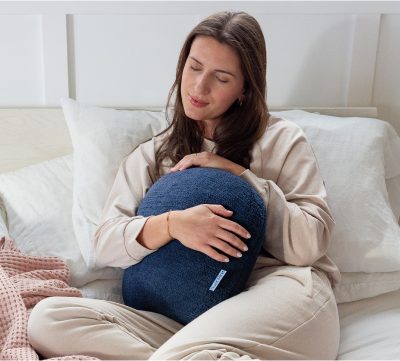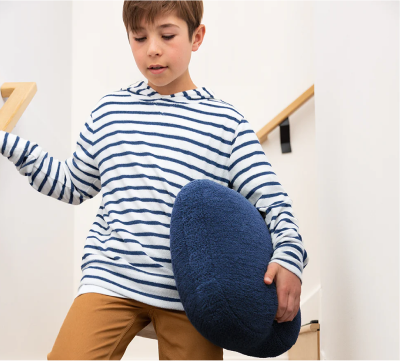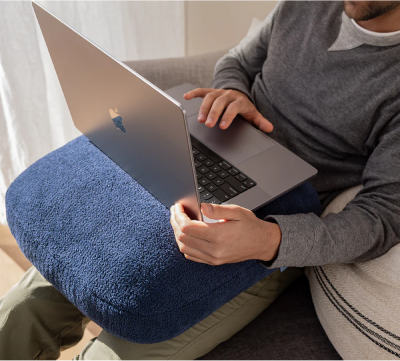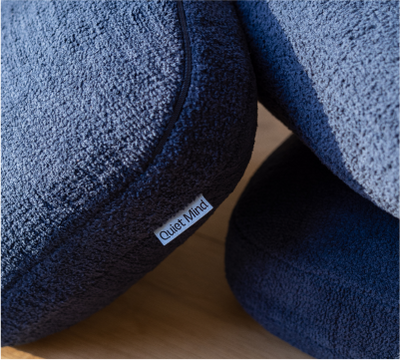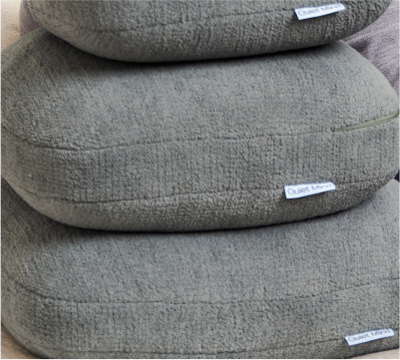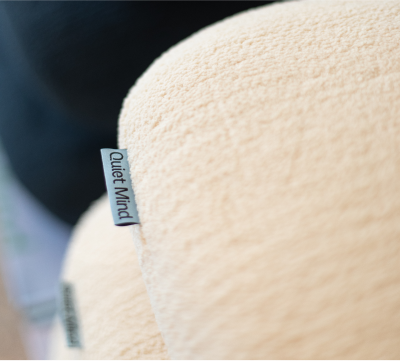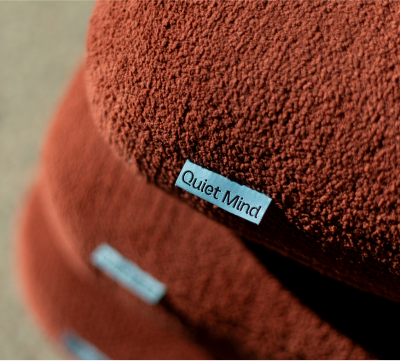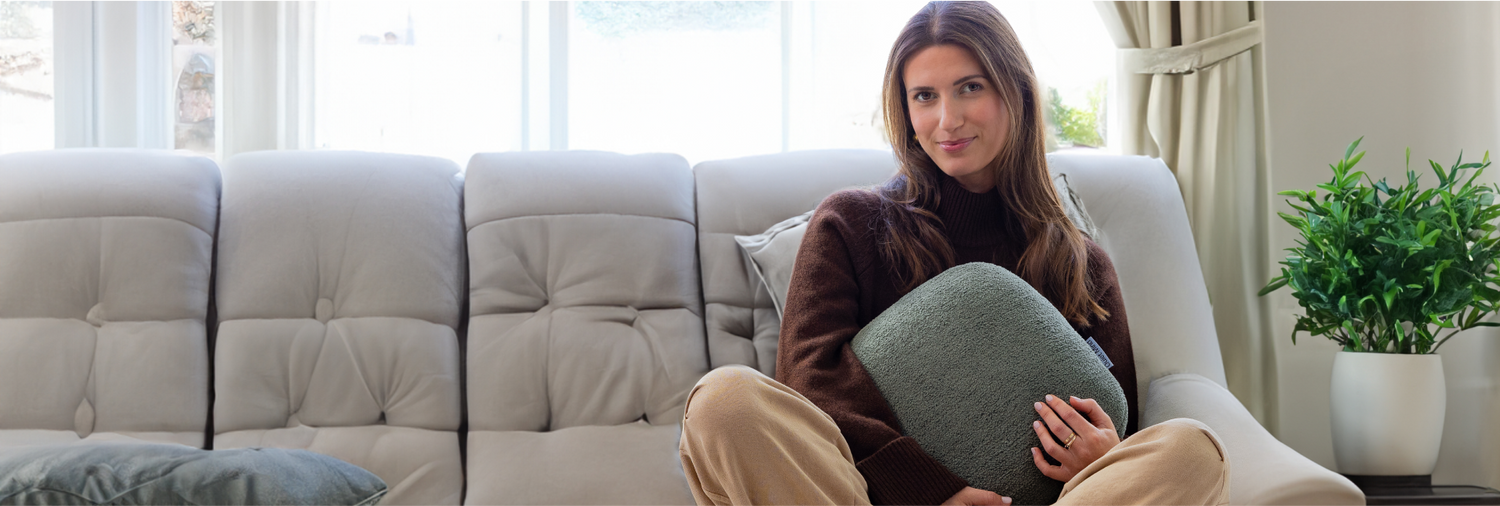In a world filled with distractions, Attention Deficit Hyperactivity Disorder (ADHD) can be a formidable challenge for both adults and children. The familiar symptoms - struggling to focus, battling disorganization, mood swings, brain fog, and a constant sense of inner turmoil - can make everyday life feel like an uphill battle.
While conventional wisdom often points toward stimulant medications as the go-to solution, their potential side effects have led an increasing number of adults and parents to explore a different route. In this article, we’ll explore several effective strategies for managing ADHD without medication.
Can ADHD Be Treated Without Medication?
Absolutely, ADHD can indeed be treated without medication. Numerous nonmedical approaches offer hope and relief for both adults and children with ADHD. Techniques such as deep pressure therapy, cognitive behavior therapy, and nutrition therapy offer natural avenues to address symptoms like lack of focus, impulsivity, and sensory overload.

Treating and Managing ADHD without Medication
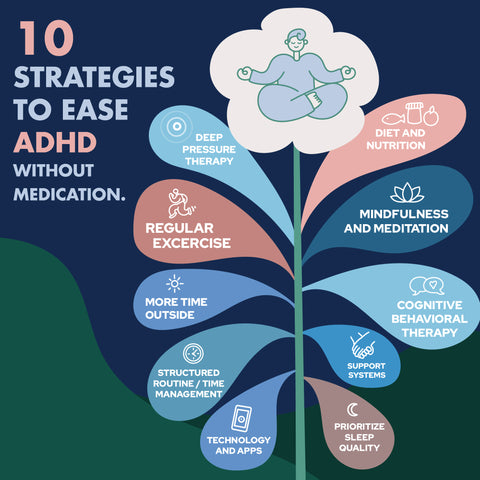
Navigating the challenges of ADHD without relying on medication is not only possible but also a path chosen by many seeking holistic solutions. Below, you’ll find a range of effective strategies that empower individuals to manage and thrive with ADHD without relying on pharmaceuticals.
From lifestyle adjustments to therapeutic techniques, these approaches offer hope and practical steps for those seeking alternatives to medication.
Harnessing the Power of Deep-Pressure Therapy
Deep-pressure therapy is a treatment technique that involves the strategic application of pressure to the body to promote relaxation and manage stress. It has been shown to be helpful for mental health conditions such as anxiety, depression, sleep disorders, and autism spectrum disorder.
Deep-pressure stimulation leverages the calming effects of deep touch pressure (DTP) to help individuals with ADHD find focus and relief from hyperactivity and impulsivity. It also stimulates the release of serotonin, a neurotransmitter that contributes to feelings of well-being and relaxation.
DTP can offer a calming and grounding experience for individuals who struggle with sensory overload related to ADHD. It also helps with the development of self-awareness and control over emotions, which can help individuals with ADHD reduce impulsive behaviors and emotional outbursts.
The calming effects of DTP can promote improved attention and focus, significantly enhancing the ability to stay on task. It can also help the brain process sensory information more effectively, resulting in a more balanced sensory experience.
One of the biggest advantages of deep-pressure therapy for ADHD is its accessibility. Tools like weighted pillows can be used virtually anywhere. This makes it a practical strategy for managing ADHD symptoms both at home and in school or work environments.
Diet and Nutrition
Diet and nutrition can play a key role in reducing the symptoms of ADHD without medication, as well as improving overall mental and physical well-being. Limiting the consumption of processed foods and sugar is essential for those with ADHD.
A balanced diet that revolves around fresh, whole, and minimally processed foods is important for overall health. It will also help to limit exposure to food coloring, additives, and preservatives that might contribute to ADHD symptoms.
What’s more, a diet that’s rich in quality proteins, omega-3 fatty acids, nutrient-dense fruits and veggies, and minimally processed grains may promote healthy brain and neurotransmitter function. Neurotransmitters influence the signals that affect focus, attention, and information processing.
Identifying and eliminating food sensitivities and intolerances that contribute to poor gut health may also be beneficial for ADHD sufferers. Poor gut health may inhibit the production of neurotransmitters and worsen symptoms like aggression and impulsivity.
Addressing common nutrient deficiencies that may be linked to ADHD could also help to manage your symptoms. If you’re wondering how to treat ADHD in adults without meds, researching the following natural remedies for ADHD may be a great place to start.
- Vitamin B6: Vitamin B6 plays a key role in the production of dopamine, serotonin, and norepinephrine in the brain, influencing mood and focus. Foods that are rich in vitamin B6 include bananas, spinach, and poultry.
- Vitamin D: Vitamin D may help to improve brain function and reduce ADHD symptoms like hyperactivity and impulsivity. Spending time outdoors is a great way to increase vitamin D production.
- Zinc: Zinc helps to regulate dopamine, which is related to attention and focus. Increasing zinc intake may help with impulse control and memory, which are also commonly associated with ADHD. Nuts, beans, and whole grains are excellent sources of zinc.
- Magnesium: Magnesium deficiency may contribute to irritability and hyperactivity, both common symptoms of ADHD. Foods such as almonds, spinach, and avocados are rich in magnesium.
- Iron: Iron promotes the production of dopamine, which may help to reduce the symptoms of ADHD. Red meat, spinach, and beans are healthy sources of iron to incorporate into an ADHD-friendly diet.
Regular Exercise
Studies have shown that regular exercise can have a positive effect on the brains of ADHD sufferers. It can help to address some of the major symptoms of ADHD, including anxiety, executive functioning issues, hyperactivity, and impulsivity.
Exercise has been shown to enhance cognitive functions, including attention, concentration, and working memory. For those with ADHD, who often struggle with maintaining focus, regular physical activity can sharpen their ability to concentrate on tasks.
In addition, exercise triggers the release of neurotransmitters like dopamine and norepinephrine, which are often imbalanced in individuals with ADHD. These chemicals play a crucial role in regulating mood and stress.
Mindfulness and Meditation
Mindfulness and meditation can play a role in treating ADHD and do wonders for our general state of well-being. In particular, mindful meditation helps to manage stress, strengthen self-regulation skills, and develop positive emotions.
By practicing mindfulness and meditation, individuals with ADHD can become more attuned to their thoughts, emotions, and physical sensations. This can lead to a better understanding of their ADHD triggers and responses, empowering them to make more informed choices.
These practices also help train the mind to sustain attention and resist distractions. They can also be immensely helpful for individuals who often act on impulse without considering the consequences. Other calming techniques like yoga and journaling can also offer similar benefits.
Spend More Time Outside
Studies show that spending time outdoors, sometimes called “green time,” can improve focus and attention span, while also decreasing impulsivity in children with ADHD. It’s also helpful for recovering from attention fatigue, which can occur after a long day at work or school.
The sights and sounds of nature have an inherently calming effect on the mind. They engage our senses and stimulate curiosity, making it easier for individuals with ADHD to concentrate on the present moment.
Green time also provides a welcome break from screens and digital devices, reducing the potential for digital distractions and information overload. And finally, spending time in nature fosters a holistic sense of well-being, contributing to better ADHD symptom management.
Cognitive Behavioral Therapy
Cognitive behavioral therapy can be very effective in helping adults and children with ADHD learn how to manage their condition. It can help them identify and modify key thought processes and behaviors and improve social skills, which can often be compromised in individuals with ADHD.
If you’re interested in learning how to focus with ADHD without medication, behavior therapy is worth a try. Your therapist can help you create structured routines, which help to improve concentration and manage distraction in individuals who have been diagnosed with ADHD.
Structured Routine and Time Management
For individuals living with ADHD, structured routines and effective time management can be transformative. These tools provide a predictable framework that minimizes distractions and maximizes productivity, helping to regain a sense of control over daily life.
Establishing a daily routine brings stability and predictability, reducing anxiety and impulsivity. Knowing what to expect and when helps individuals stay on track. Structured routines allow for breaking the day into manageable segments and prioritizing tasks effectively.
Visual tools like calendars and planners offer a tangible way to track appointments, deadlines, and commitments, aiding in organization. Allocating specific time blocks for tasks prevents task-switching and multitasking, supporting sustained focus.
Digital reminders and alarms serve as cues for prompt action, reducing the risk of forgetfulness. Planned breaks and rewards reinforce positive behaviors and encourage sustained focus. Sharing these routines and goals with trusted individuals provides external accountability and support.
Technology and Apps
In today’s digital age, technology and smartphone apps can be useful tools for managing ADHD symptoms. They can offer structure, organization, and support, making it easier for individuals with ADHD to navigate their daily lives.
Task management apps help individuals prioritize and schedule tasks efficiently. Time-tracking apps can be used to improve attention and productivity. And, calendar apps are ideal for scheduling appointments, setting reminders, and creating visual schedules.
Habit-tracking apps can also be useful for reinforcing positive behaviors and transforming self-improvement into an engaging activity. Mindfulness and meditation apps can help to facilitate relaxation exercises, reducing stress and enhancing attention and emotional regulation.
And finally, ADHD-specific apps can address ADHD-related challenges, offering features like task management, organization, and time tracking. These digital resources not only complement other ADHD management strategies but also provide a sense of empowerment and control over daily life.
Support Systems
Support systems are a cornerstone of effective ADHD management. Whether it’s the understanding of family members, the guidance of mental health professionals, or the camaraderie of support groups, having a reliable network can make all the difference.
These support systems offer emotional encouragement, practical advice, and a sense of belonging that can help individuals with ADHD navigate challenges, build coping strategies, and sustain their commitment to non-medical management approaches.

- Raising B
Prioritize Sleep Quality
Prioritizing sleep quality is an essential part of treating ADHD without medication. Although science has yet to confirm whether sleep disturbances are a result of ADHD or simply exacerbate the symptoms, it's clear that sleep plays a crucial role in overall health and well-being, including managing ADHD symptoms.
For example, a consistent and adequate sleep schedule can improve focus, attention span, and energy levels. Feeling tired can also aggravate your ADHD symptoms and make it more difficult to function throughout the day.
Incorporating physical activity into your routine can improve sleep quality and regulate sleep patterns, leading to a rested and alert state during the day. Hugging a weighted pillow has a calming effect on the nervous system, reducing anxiety and promoting more restful sleep.
Wrapping Up
From deep-pressure therapy to dietary adjustments, there are many ways to manage ADHD without medication. Quiet Mind’s Original Weighted Pillow is an ideal place to start because it offers the calming benefits of deep touch pressure therapy right in the comfort of your own space.
Your path to ADHD management and a quieter mind begins with this simple yet powerful addition to your daily routine. Discover the tranquility it can bring to your life and take the first step toward a more focused future!
